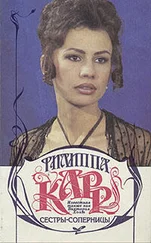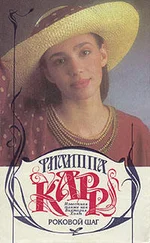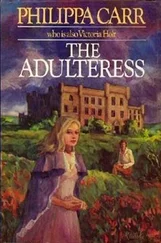Филиппа Карр - The changeling
Здесь есть возможность читать онлайн «Филиппа Карр - The changeling» весь текст электронной книги совершенно бесплатно (целиком полную версию без сокращений). В некоторых случаях можно слушать аудио, скачать через торрент в формате fb2 и присутствует краткое содержание. Жанр: Исторические любовные романы, на английском языке. Описание произведения, (предисловие) а так же отзывы посетителей доступны на портале библиотеки ЛибКат.
- Название:The changeling
- Автор:
- Жанр:
- Год:неизвестен
- ISBN:нет данных
- Рейтинг книги:5 / 5. Голосов: 1
-
Избранное:Добавить в избранное
- Отзывы:
-
Ваша оценка:
- 100
- 1
- 2
- 3
- 4
- 5
The changeling: краткое содержание, описание и аннотация
Предлагаем к чтению аннотацию, описание, краткое содержание или предисловие (зависит от того, что написал сам автор книги «The changeling»). Если вы не нашли необходимую информацию о книге — напишите в комментариях, мы постараемся отыскать её.
The changeling — читать онлайн бесплатно полную книгу (весь текст) целиком
Ниже представлен текст книги, разбитый по страницам. Система сохранения места последней прочитанной страницы, позволяет с удобством читать онлайн бесплатно книгу «The changeling», без необходимости каждый раз заново искать на чём Вы остановились. Поставьте закладку, и сможете в любой момент перейти на страницу, на которой закончили чтение.
Интервал:
Закладка:
“Well, he was the French Emperor before the war, wasn’t he?”
“Exactly. It is a great mistake for people to have responsibility simply because they are related to the great. There was only one Napoleon. We did not need a second or a third.”
“I suppose it is their name,” I said. “And they have a right to it.” His father was Louis Bonaparte, King of Holland, brother of the first Napoleon, and his mother Hortense de Beauharnais, Napoleon the First’s stepdaughter,” said Miss Brown, who could never resist turning any conversation into a lesson. From an early age he wanted to follow in his uncle’s footsteps.”
So he succeeded in becoming Emperor,” said my grandmother.
And his early career was one disaster after another,” continued my grandfather who was as interested in history as Miss Brown. “His vainglorious attempts to call attention to himself resulted in a term of imprisonment. First he was shipped to the United States and then he came here to England where he was for a while, but he saw his chance with the outbreak of the revolution in ‘48, returned to France, acquired a seat in the National Assembly, and started to work for the imperial title.”
“Well, he succeeded in getting it, apparently,” said my grandmother.
“Yes, for a time.”
“Quite a long time, I believe,” she replied.
“He wanted a name to compare with that of his uncle. But he hadn’t the same genius.”
“And where did Napoleon’s genius lead him?” demanded my grandmother. “Elba and St Helena,” I cut in, eager to show them that I knew something of what they were talking about.
Miss Brown threw me a glance of approval.
“All might have been well,” continued my grandfather, “if he had not become jealous of the growing power of Prussia, and underestimated it. He provoked war with Prussia. He thought he could defeat them easily and win glory for himself. He reckoned without the discipline of the Prussians. He must have known his fate was sealed at Sedan.”
“And then the Bourdons decided to get away,” I said, trying to turn the conversation to a subject of more immediate concern to us.
“Very far-seeing indeed,” said my grandfather. “Revolution in Paris ... disaster for Napoleon In. And as a consequence we have the Empress and her son at Camden House in Chislehurst... and the Emperor has now joined her ... no longer a prisoner ... but an exile from his country.”
“Like the Bourdons,” I said.
My grandmother smiled at me. “You should never let your grandfather get on to history,” she said. “There is no stopping him once he gets started.”
“A fascinating subject,” said Miss Brown with a smile.
Just as we were leaving the dining room, one of the grooms came in with a note for my grandmother.
Bourdons were all delighted to accept her kind invitation to luncheon.
They came as arranged and it was a very interesting meeting.
Monsieur and Madame Bourdon were, as my grandmother , commented afterwards, typically French. He had a trim pointed beard, crisp dark hair and a very gallant manner. He kissed hands … even mine ... and the look he gave my grandmother was clearly one of admiration. Madame was a good-looking woman and her vivacity and charm made her seem ten or fifteen years younger than she must have been. She was inclined to be plump; her hair was faultlessly dressed and her large brown eyes gave the impression that she missed little. Their English was barely adequate, but I found that quaint and charming.
The son and daughter were like their parents and I detected similar qualities. The young man’s gallantry and awareness of feminine society for instance; the girl’s svelte appearance.
They admired Cador’s impressiveness and antiquity; and my grandmother said she would show them the house after luncheon if they wished to see it. Monsieur Bourdon said it would be a great pleasure, Madame declared it would give her immense delight, and the son and daughter echoed their parents’ words.
Over lunch they talked of the terrible events in their country which had led to their exile.
I gathered that Madame Bourdon was acquainted with the Empress Eugenie and that Monsieur Bourdon had, on several occasions, been admitted to the society of Napoleon In. Now that our Emperor and Empress are in England ... we ‘eel that we must be with them,” said Monsieur Bourdon halt-My grandmother asked them how much they liked High Tor. Very well ... very well,” was their reply.
DO you think you will return to France?” asked my grandfather.
Monsieur Bourdon put the palms of his hands together and took his head from side to side, shrugging his shoulders at the time.
“It could be ... yes. It could be ... no. La Republique.” He grimaced. “If the Emperor returns ...”
“I should hardly think he would do that for a very long time,” said my grandfather. “And in the meantime he lives in exile,” added my grandmother. “I wonder how they feel about that. It must be strange to go from all the pomp and ceremony of the French Court to quiet Chislehurst.”
“Perhaps he is happy to escape to that quiet spot.”
I noticed that Jean Pascal was watching Jenny, the parlormaid who was serving at table. Their eyes met as she held a dish of vegetables for him. She was flushed. Jenny was interested in young men, I knew. I promised myself that I would try to find out what she thought of this one.
When the meal was over we showed them over Cador.
I was with them. I liked to hear my grandfather explain the history of the place. He loved the topic so much and spoke so enthusiastically that my grandmother gently put an end to his discourse which she feared might be boring to the guests. We were in the gallery in which were displayed some old tapestries, some in the region of five hundred years old, when Madame Bourdon became very excited. “Cette tapisserie ... it is ... how you say? ... er ... made right?”
“Repaired? Oh yes. We had to have it done. I think it was mended rather well.”
“But ... it is very good.”
“You noticed.”
“My wife ... she is very interested,” explained Monsieur Bourdon. “We have some tapestries ... very good ... very old ... Gobelins ... You understand?”
“Indeed yes,” said my grandmother. “That must be wonderful.” Jean Pascal, who was more fluent in our language than his parents were, said that they had brought some of their most valuable tapestry with them. They had been going to have it repaired in France, but if there was someone who could repair it as well as ours had been done, perhaps it would be possible for theirs to be done here.
“It was a young girl living quite near here who restored these years ago,” said my grandmother. “She is very clever with needle, as you see. She is a professional seamstress and does broidery on garments and such things which are sold in the shops of Plymouth ... at quite high prices I imagine.”
Madame Bourdon became very excited.
“If you could tell my mother where to find this embroiderer, she would be very grateful to you,” said Jean Pascal.
My grandmother was thoughtful. She glanced at my grandfather “It’s Leah,” she said, “and that makes it a little awkward. You know how Mrs. Polhenny was about letting Leah come up here.”
She turned to our guests. “I will speak to the girl’s mother and ask her if she will allow the girl to go to High Tor. You see, her mother likes her to work at home.”
“We will pay well ...” began Jean Pascal.
“Leave it to me. I will do what I can.”
We left it at that and there was a great deal of talk about tapestry. Apparently the Bourdons had some priceless pieces in their collection - one from the Chateau of Blois and another which had been in Chambord.
Читать дальшеИнтервал:
Закладка:
Похожие книги на «The changeling»
Представляем Вашему вниманию похожие книги на «The changeling» списком для выбора. Мы отобрали схожую по названию и смыслу литературу в надежде предоставить читателям больше вариантов отыскать новые, интересные, ещё непрочитанные произведения.
Обсуждение, отзывы о книге «The changeling» и просто собственные мнения читателей. Оставьте ваши комментарии, напишите, что Вы думаете о произведении, его смысле или главных героях. Укажите что конкретно понравилось, а что нет, и почему Вы так считаете.






